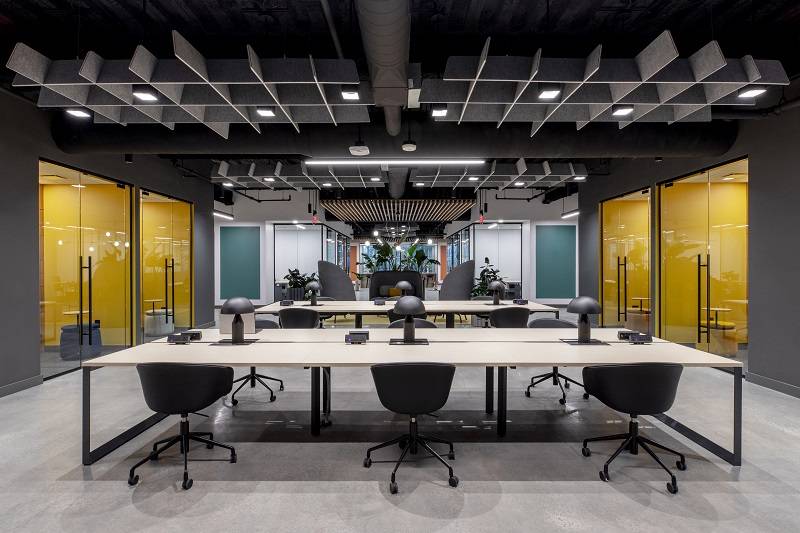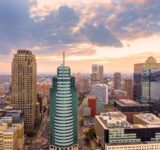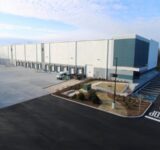As workers grow tired of doing their jobs from home, the demand for safe but flexible office space has fueled activity at Colab, a 25,000-square-foot co-working space at Bell Works in Holmdel, which has more than 200 members. — Courtesy: Bell Works
By Kathleen Lynn
After 18 months doing their jobs from home because of COVID-19, many New Jersey workers are returning to flex and co-working spaces, according to several companies in the industry.
Operators, which include a growing number of landlords that are managing the spaces directly, say they have added more private suites to their offerings to make users feel safer from infection. And while they’re keeping a wary eye on COVID’s Delta variant, which is slowing the national recovery from the pandemic, they’re optimistic about demand, for both the short term and long term.

“We have never been busier,” said Sean Donohue, managing director of Colab, a 25,000-square-foot co-working space at Bell Works in Holmdel, which has more than 200 co-working members. Building owner Somerset Development debuted the facility last fall, offering more than six times the space of the original flexible office facility that opened at the site in 2016.
IWG, the co-working giant based in England, recently said that demand in the U.S. rose 43 percent in June, compared with the pre-pandemic period of June 2019. IWG has 38 locations under the Regus brand name in New Jersey.
At Mission 50 in Hoboken, the story is similar. In spring 2020, after the state went into near-lockdown in the face of surging COVID cases, most tenants didn’t renew their leases, according to Greg Dell’Aquila, CEO of JDA Group LLC, which owns and manages the property at 50 Harrison St. But as of late August, the 80,000-square-foot space was about 85 percent full.

One big reason, co-working companies say, is that many people have become weary of working at home. Dell’Aquila gave the example of two-career couples with young children unable to go to school or daycare.
“They’re all at home,” he said. “It’s impossible to get work done in that environment.”
People who live alone have their own challenges with remote work, he added.
“They’re losing their minds,” Dell’Aquila said. “They have no interaction.”
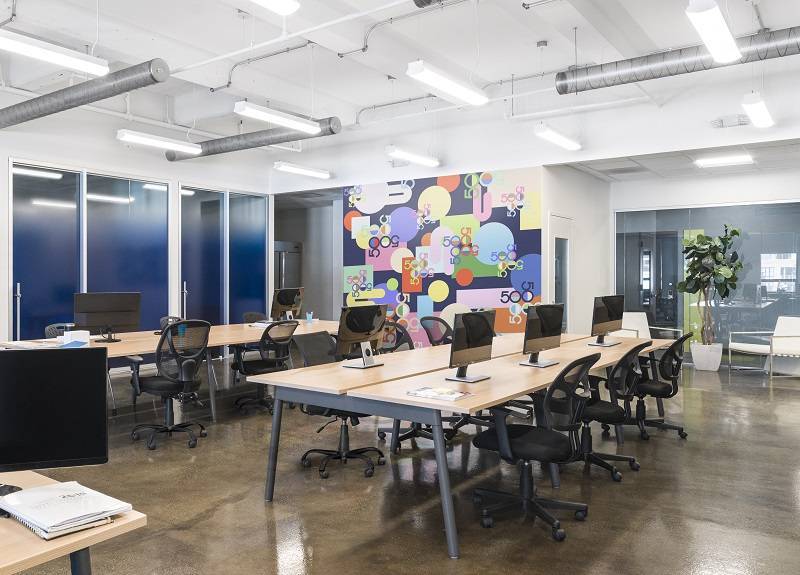
And the innovative ways of doing business that became widespread during the pandemic? Not so exciting anymore. “Zoom fatigue is a thing,” Donohue said.
In the new COVID reality, co-working companies say they’ve taken extra precautions to keep workers safe — such as improving the ventilation systems, adding more hand-sanitizing stations, ramping up the cleaning schedule and creating more space for workers.
“It made us take a closer look at some of the things we were doing,” Donohue said, noting that Colab spaced out desks and added more dividers. In addition, there’s an effort to reduce touch points: Light switches are motion-sensitive and, in the kitchen, food is individually wrapped.
In addition, Donohue said, “We increased the number of private offices, knowing that people might feel more comfortable with four walls.”

At Kearny Point, a mixed-use business campus in Kearny, the open co-working space, totaling about 10,000 square feet, was rented out to a single user — no more desks in a common space to rent by the day. Instead, the owner, Hugo Neu, found clients more interested in individual offices, according to Steve Nislick, chief financial officer. The landlord now has about 250,000 square feet and is about 85 percent leased, he said.
“A good portion of our absorption has been from existing tenants expanding,” Nislick said.
At Desk, a new co-working space at 37 Easton Ave. in New Brunswick, most of the 11,000 square feet is devoted to private offices, each with space for one to eight workers, according to founders Alex Burkhead and Gerrit Curran.

“When you come into work, you can go into an office and be self-contained,” Curran said. They’re watching Delta and say they will be ready to add more safety measures — such as additional barriers — if necessary.
The two, who are working in partnership with Saxum Real Estate, had originally hoped to open their New Brunswick location in early 2020, but were delayed when the pandemic hit. Now, they feel there’s enough interest to move forward.
“The demand has proven to be 100 percent there,” Curran said. They plan to open a second space in an old bank building on Bloomfield Avenue in Montclair in early 2022.
Over the longer term, co-working companies say the disruptions created by COVID may increase demand for their product. Employees who suddenly didn’t have to go to offices found they were happy to forgo their commutes and gain an extra hour or two every day for themselves. And many employers found that workers were just as productive.
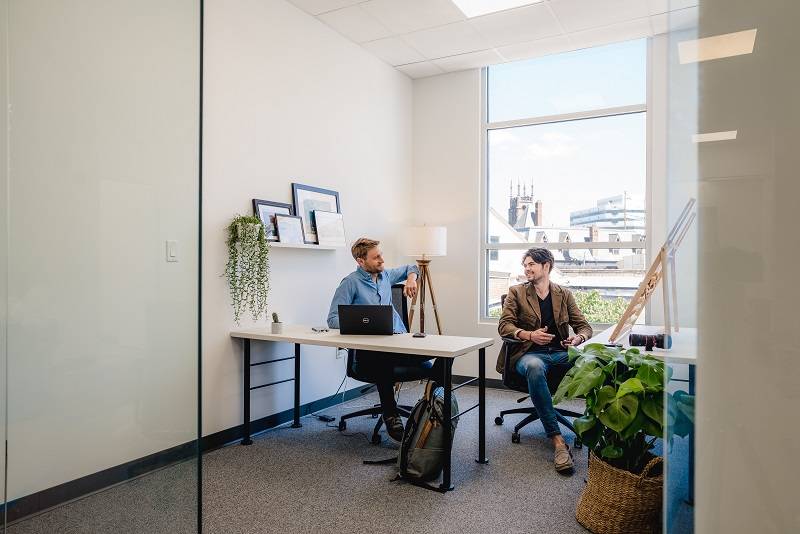
As a result, many observers predict that, as COVID recedes, large employers may allow employees to work at least part of the time at home or at co-working spaces closer to home, rather than make the long trip to the urban core — the so-called hub-and-spoke approach.
Mark Dixon, founder and CEO of IWG, said in a recent company blog post that employers are moving “to a hybrid way of working: at home, a local office and occasionally a corporate HQ.”
Donohue agreed, predicting that the message from bosses to workers will be: “We understand you may not want to come to New York City every day, but you’d like to be in a professional environment that’s 10 or 15 minutes from home, whether full-time or a couple of days a week.”
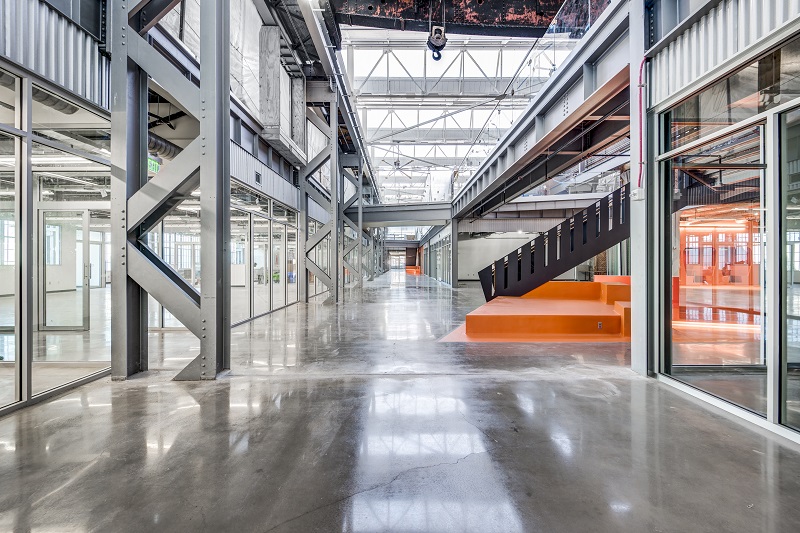
Second chance space
Many flexible workspaces in New Jersey are examples of adaptive reuse — repurposing other types of space for offices — or part of a larger effort to reposition an outdated property.
Bell Works’ Colab, for example, is part of the redevelopment of the 2 million-square-foot Bell Labs research campus in Holmdel. The developer, Somerset Development, has remade the landmark midcentury building, designed by the famed modern architect Eero Saarinen, into a sort of mixed-use downtown for Holmdel, which lacks a traditional shopping district. And the company recently announced that it will open another flex space at Bell Works, a 72,000-square-foot area called Campus.
At Colab, offerings start with a $25 daily pass, which offers access to an open space, with amenities like coffee and printing, for workers who bring in their own laptops. At the top end, a suite with two private offices and a common area runs $3,500 to $4,000 a month.
At Desk, the New Brunswick space is inside the former Rutgers bookstore, and the planned Montclair space will be in a historic bank building.
Industrious has a 31,000-square-foot co-working space at the Short Hills Mall — a spot that was once part of a now-closed Saks department store. The company reports that workers are returning, and that they like the convenience of being steps away from stores and restaurants in the mall. According to a company spokesman, workers are using the location “as a third-party space in addition to commuting to their offices in New York City and working from home.”
At Kearny Point, a long-vacant 130-acre former shipbuilding complex, the design of its spaces pay tribute to its industrial past, with concrete floors and exposed ducts.
At Mission 50, the co-working space has grown within a traditional, 78,000-square-foot office building. Owner JDA Group started out with just a small co-working space of about 5,000 square feet. It tested the concept over a decade, a period that included Hurricane Sandy, and decided there was enough demand to expand the co-working and flex space to about 20,000 square feet.
“It was 10 years of watching it through the business cycles,” JDA Group CEO Greg Dell’Aquila said. “It has been proven that in this location, this building, people want this product.”
Connell blends co-working, social club in latest addition to flagship Berkeley Heights campus

